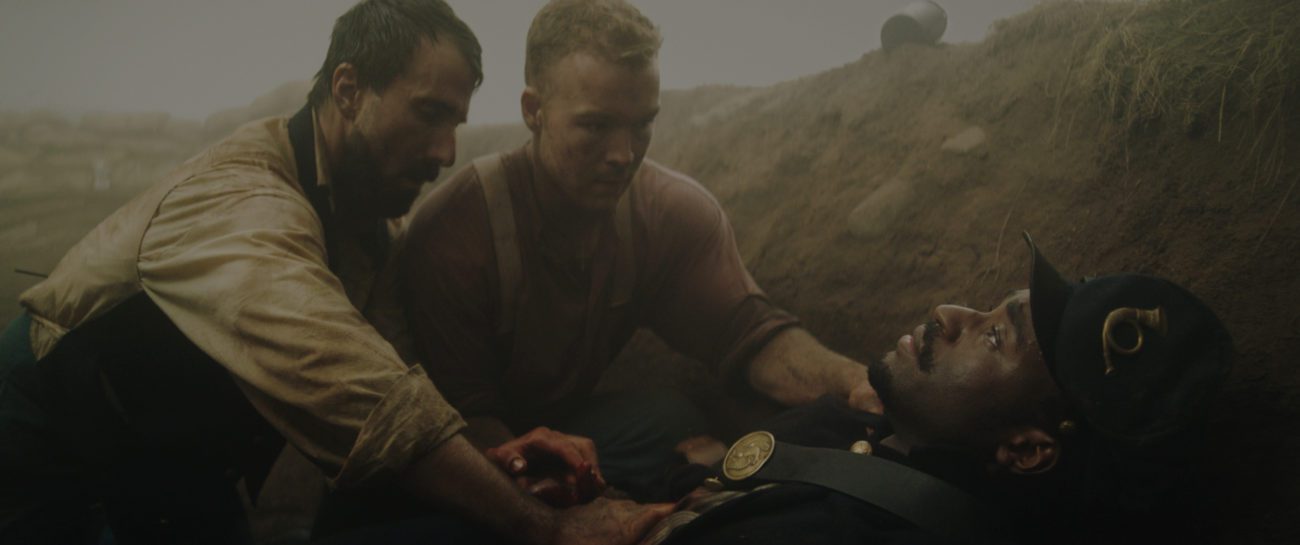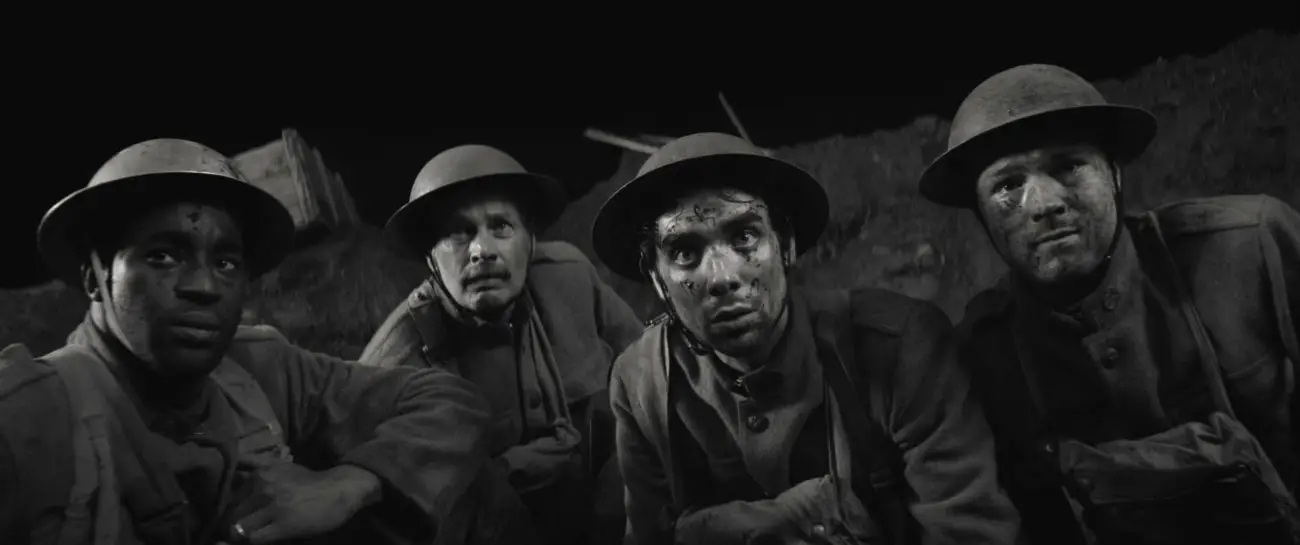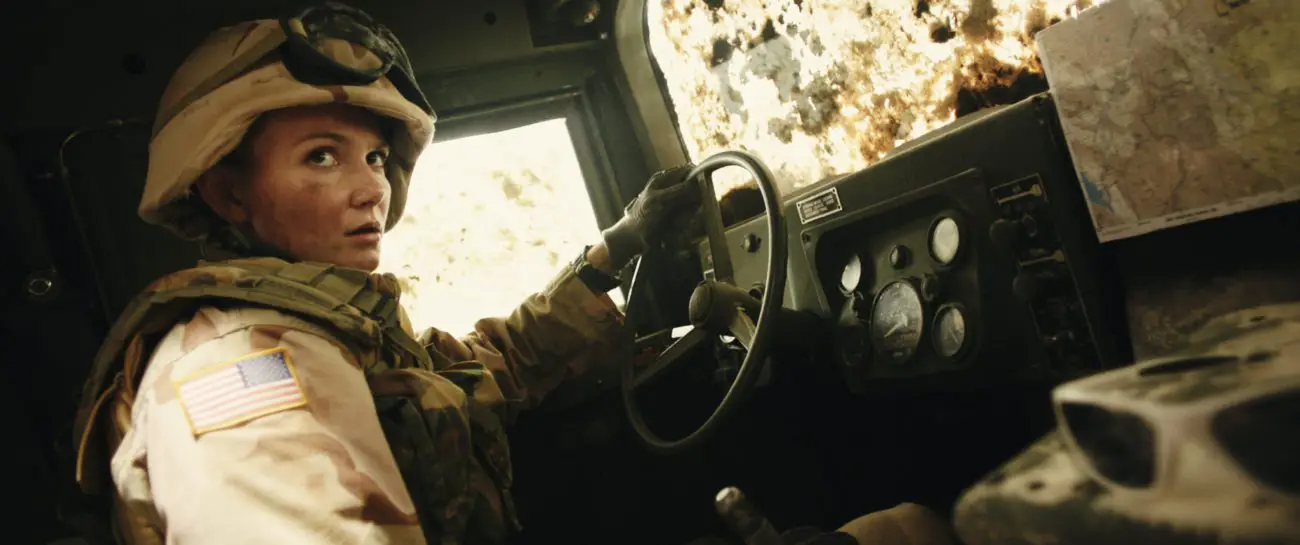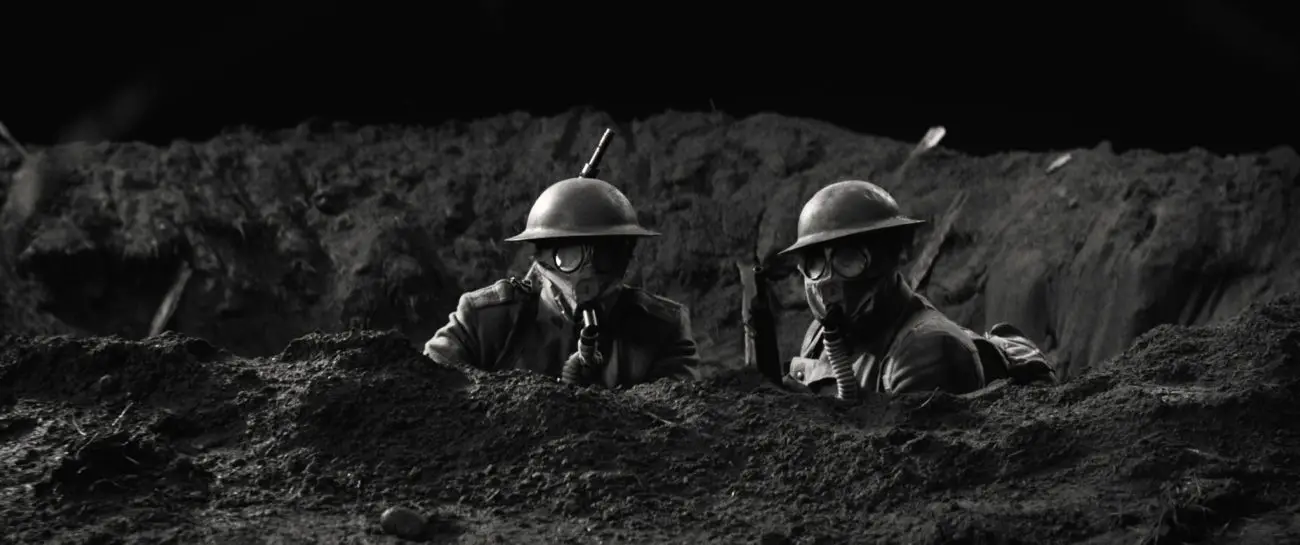By observantly depicting three wars from three different centuries using the same troupe of actors, Foxhole filmmaker Jack Fessenden holds a multi-faceted mirror up to the humanity and mortality of war. His sophomore feature film questions if the causes have or have not changed when it comes to those two pillars. The way he measures that is within the soldiers themselves when placed in their most confined circumstances. As you can tell or if you’ve seen other war movies, foxholes are not pretty or fancy. They will never be a celebrated or romanticized military landmarks. Instead, they are places bitten, scratched, and clawed at to gain or extend personal and instinctual survival.
Nonetheless, a foxhole and its dynamics are so much more than that. It can be a makeshift shelter or a final grave. They can be toils of monotony, labor, and tested patience. Likewise, they can be suffocating traps of tight quarters, constant danger, and heightened fears. Strategically, they are pivot points for a larger battle where men and plans are organized. Lastly, they are places of reflection as to how one arrived there and how they can get out of this temporary hell alive to return home.
Foxhole brilliantly multiplies and then narrows both the squalor and valor of war down to these intimate places when men are either made or destroyed. By fastening itself to these settings, Foxhole triples the courageous and sacrificial conundrums of when to leave such places, should you, and why. Causes and legacies, right and wrong, and life and death are shaped by those precarious actions presented by Fessenden in a very spellbinding picture.

The film opens descending down from overhead fog to a Civil War battlefield strewn with fallen soldiers. One Confederate soldier (Asa Spurlock of Stray Bullets) bursts from unconsciousness and gathers himself to find his way out of the mist. He encounters a Black Union soldier (Anya’s Motell Gyn Foster) and loses an exhausting hand-to-hand battle for a pistol. The victor makes his way to an emptied Union line badly wounded.
The commanding officer Morton (TV actor Alex Hurt) and his men are initially taken aback by the sight of Jackson’s color only to learn from him that several regiments of Confederates are organized to hit this battlefield at first light in a few hours. Their vital fortification efforts can slow the oncoming enemy down, but staying there is a death sentence to the bleeding man. Morton is faced with the choice to keep his squad at full strength or weaken it by sending two of them, the mouthy Clark (Cody Kostro of Mare of Easttown) and the god-fearing Conrad (The Kitchen’s Angus O’Brien), away as stretcher-bearers to save Jackson’s life.

Shifting to a black-and-white palette and the barbed wire entanglements of World War I, a German scout (Alex Breaux of Hustlers) stumbles into an Allied trench and silently surrenders. This Morton wishes to immediately execute the prisoner. He fears that subtracting a man for guard duty slows down the necessary wire construction and that the prisoner can scream out and give away their location at any moment. Holding a pointed gun to dispatch the foe, his men are torn on what to do to ease the situation.
Jumping forward to the squinting brightness of a searing desert, our character archetypes now occupy an armored Humvee in 2004 Iraq. Jackson is in charge riding shotgun with Morton’s enlisted wife Gale (Andi Matichak of the new Halloween series) driving to catch up to the convoy ahead. When their vehicle is hit and disabled, the unit finds themselves pinned down with no nearby backup. They can either stay in their sitting duck position or make a run for a nearby ridge with their wounded.

Much of Foxhole’s tension and focus can be credited to the small scale created by the movie’s titular boundaries of man-made burrows. Production designer Tim Bruno (Antarctica) and first-time set decorator Tony Sanchez constructed three distinct pits that might as well be single-set plays in disguise. They are welcoming to all the muddy smears of dramatics and hint at the unseen risks nearby. Cinematographer Collin Brazie (Just One More Kiss) sees to that closeness with clever angles and hiding the edges with gray fog, monochromatic darkness, and infinite sand with his visual palettes of the three eras. Abigail Savage’s (The Spine of Night) sound design and Fessenden’s own moody musical score punctuate the mounting fear from there quite effectively.
Among the small cast, the crucial anchor in all three sections is the Wilson character played by James LeGros, this film’s biggest name with a deep resume of Hollywood and indie successes from Drugstore Cowboy to Certain Women. His mustached and more senior presence is the chosen voice of reason. He can quell the younger men’s anxieties, provide inclusional empathy for Jackson, and have the respectful wisdom to ease Morton’s burden of leadership. Call him the heart-and-soul if you must, but it’s still sagacity prepared by toughness and service in a very warm performance from LeGros.

Wilson is the forthright mouthpiece of humanity in these grim settings of war. He spells out lives that are in others’ hands and the courage that exists to spare a life rather than take one, even when the feelings of self-preservation are at their highest. Honor is outlined and proper duties are reminded and reinforced in efforts to avoid the immoral, cruel, and unjust urges that keep men from the right paths. This virtuous conflict to retain humanity is greater than any with a firearm.
Like a young Robert Rodriguez, for Jack Fessenden to write, edit, score, direct, and ferment this moral base into Foxhole as solid as it turns out is extremely impressive. This could have easily been a haphazard combination of three disconnected short film experiments of dudes jawing machismo and busting balls before hitting superhuman hero mode marks for easy victory and sweaty applause. When the sh*t hits the fan, Foxhole certainly amplifies the suspense to circle back for the results of each chapter’s perilous decisions. Yet, in every exciting conclusion, the compelling people and what they wrestle with matter more than any muscular spectacle.




